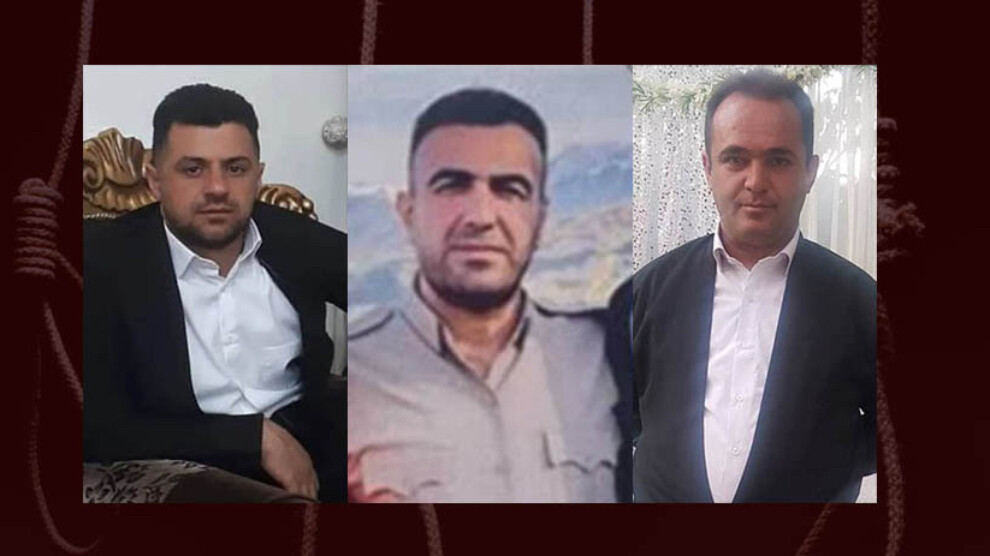KHRN: Iran secretly executed three Kurdish prisoners
Three Kurdish prisoners in Orumiyeh Central Prison were executed in haste despite the fact that the Supreme Court had not yet formally communicated their death sentences to their lawyers.
Three Kurdish prisoners in Orumiyeh Central Prison were executed in haste despite the fact that the Supreme Court had not yet formally communicated their death sentences to their lawyers.

Kurdish prisoners Edris Ali, Azad Shojaei and Rasoul Ahmad Rasoul were executed Wednesday morning in Orumiyeh Central Prison for alleged “espionage and collaboration” with Israel, the Kurdistan Human Rights Network (KHRN) reported.
According to the report, the three men were executed in secret, without being allowed final visits with their families.
Ali and Shojaei, from Sardasht in West Azerbaijan Province, and Rasoul, from Qaladiza in the Kurdistan Region of Iraq, had previously been sentenced to death on charges of “enmity against God” (moharebeh) and “spreading corruption on Earth” (efsad-e fel-arz) through alleged “espionage for Israel”.
The three prisoners were executed in haste despite the fact that the Supreme Court had not yet formally communicated their death sentences to their lawyers.
The men were transferred to solitary confinement on 24 June in preparation for execution, and were executed in the early hours of 25 June, without any prior notice to their families or legal representatives.
After learning of the executions, the families went to the prison, but the authorities have so far refused to hand over the bodies.
Mizan News Agency, affiliated with Iran’s judiciary, confirmed the executions in a report published yesterday morning, and stated: “Edris Ali, son of Saleh, Azad Shojaei, son of Abdolrahman, and Rasoul Ahmad Rasoul, son of Ahmad, who had smuggled equipment into the country for the purpose of assassinating figures, were arrested and tried on charges of enmity against God, and of spreading corruption on Earth by collaborating with foreign governments hostile to Iran in favour of the Zionist regime. Following the completion of due legal procedures and the confirmation and finalisation of the verdicts by the Supreme Court, Edris Ali, Azad Shojaei, and Rasoul Ahmad were punished for their actions and hanged this morning.”
However, contrary to the claims of the judiciary, the three prisoners, who worked as kolbars and tradesmen in border regions, denied all accusations of collaborating with Israel throughout their interrogations and court proceedings.
Even the official report from the Ministry of Intelligence states that the men were unaware of the contents of a shipment they brought into Iran, which may have contained equipment used in the assassination of nuclear scientist Mohsen Fakhrizadeh in 2020.
Other individuals involved in transporting the shipment from Sardasht to Tehran were arrested but later acquitted.
Ali and Shojaei, who are from the border village of Duleh-ye Garm in Sardasht, and Rasoul Ahmad Rasoul, from Qaladiza in the Kurdistan Region of Iraq, were arrested by Ministry of Intelligence forces in Sardasht in July 2023 and taken to the Ministry’s detention centre in Orumiyeh, West Azerbaijan Province.
The three men were held in solitary confinement for several months and subjected to severe physical and psychological torture in an attempt to force them to confess to the charges of “espionage for Israel” and “transporting equipment used in the assassination of Mohsen Fakhrizadeh”.
During their initial interrogations, they denied all the charges; however, under torture, they were forced to make false confessions.
After more than three months in detention, they were allowed to make their first phone call to their families, and after more than eight months in solitary confinement, they were transferred to Orumiyeh Central Prison.
Their trial was held on 23 September 2023 at Branch Two of the Islamic Revolutionary Court of Orumiyeh, presided over by Judge Ghorban Shahini and Judge Esmail Bazarkari as advisor, and they were sentenced to death a month later.
They were denied access to legal counsel during the investigative phase and were only permitted to have lawyers once the case had reached court.
In a separate case, they were sentenced to three years and seven months in prison and fined for “alcohol smuggling”.
On 5 November 2024, Judiciary spokesperson Asghar Jahangiri stated during a weekly briefing that three people had been sentenced to death in an investigation into the assassination of Fakhrizadeh.
Without naming the three men, Jahangiri noted that the defendants had been charged with “espionage for Israel” and “importing assassination equipment disguised as alcoholic beverages” through West Azerbaijan Province.
He said: “In the case of the assassination of Martyr Fakhrizadeh, three people were sentenced to death at the preliminary stage for spying for Israel. In this case, eight people were arrested in West Azerbaijan Province, three of whom smuggled the equipment used in the assassination under the guise of trafficking alcohol. These three individuals have been sentenced to death in the first instance and their cases are now under appeal”.
After their lawyers filed appeals, the case was referred to Branch Nine of the Supreme Court. However, before the death sentences were formally communicated, the prisoners were executed.
The lawyers only discovered through the official judicial portal Sana that the Supreme Court had upheld the death sentences on 21 June 2025.